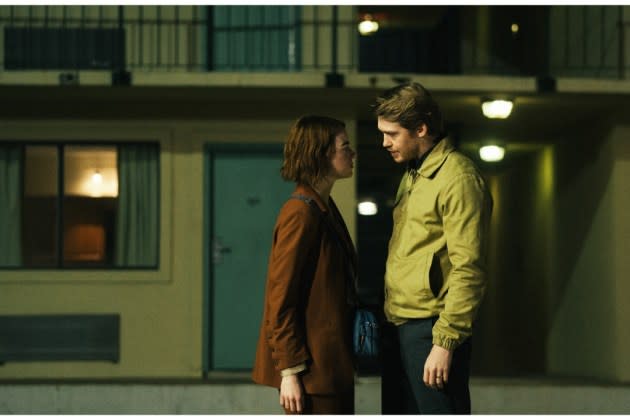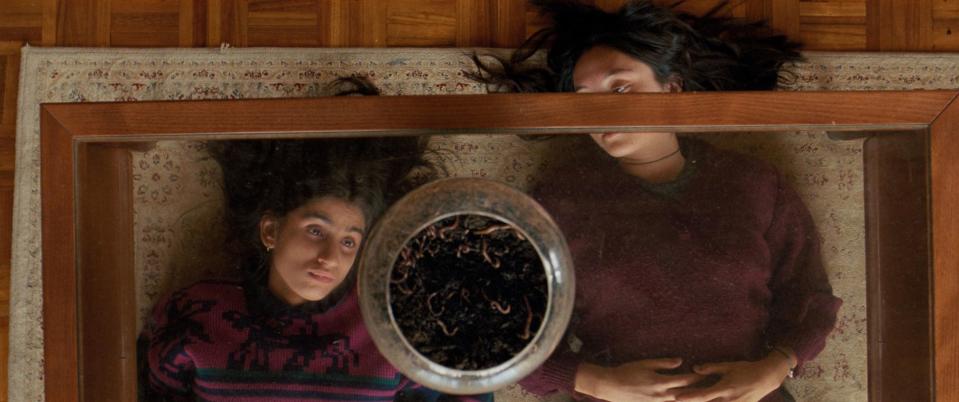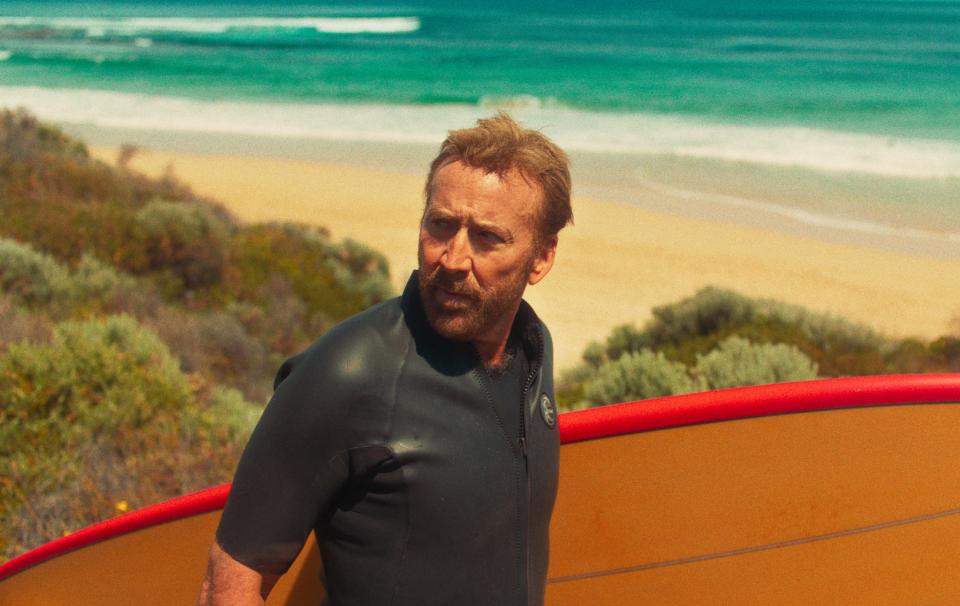Hot Spots: How Ireland’s Booming Screen Sector Shows No Signs Of Slowing Down And Why It’s “An Overnight Success, Thirty Years In The Making”
- Oops!Something went wrong.Please try again later.
- Oops!Something went wrong.Please try again later.
- Oops!Something went wrong.Please try again later.

Ireland’s screen industry is having a moment. With the Cannes Film Festival well underway, there’s a notable strong Irish presence in this year’s line-up including Element Pictures’ three entrants – Competition title Kinds of Kindness from Yorgos Lanthimos, Rungano Nyoni’s sophomore feature On Becoming A Guinea Fowl and Ariane Labed’s directorial debut September Says (both in Un Certain Regard). There’s also Competition title The Apprentice, which is co-produced with Irish outfit Tailored Films and Lorcan Finnegan’s Nicolas Cage starrer The Surfer premiering in the Midnight Screenings strand. Even Andrea Arnold’s Competition title Bird is rich with Irish talent with star Barry Keoghan and Oscar-nominated cinematographer Robbie Ryan both having worked on the film.
Irish actors continue to earn international acclaim – from Cillian Murphy’s Oscar win earlier this year for Best Actor in Oppenheimer and talent such as Paul Mescal, Jessie Buckley Keoghan all being nominated for Academy Awards in the last few years. Element Pictures’ Poor Things, starring Emma Stone and Mark Ruffalo,scored 11 nominations alone.
More from Deadline
'The Surfer' Review: Nicolas Cage Battles Board-Stealing Aussie Beach Bums - Cannes Film Festival
'Poor Things' Producer Element Pictures Soars To A New Level With A Triple Bill Of Films For Cannes
Recent years have seen the Emerald Isle hit a number of new milestones in the film sphere with Colm Bairéad’s Irish-language title A Quiet Girl earning an Oscar nomination for Best International Feature Film in 2023 and Rich Peppiatt’s Kneecap becoming the first ever Irish-language picture to be selected for the 2024 Sundance Film Festival. In February of this year, Tim Mielants’ Small Things Like These was the first Irish film to open the Berlin International Film Festival.
It’s impressive stats for a nation that has a population of just 5 million people with limited access to financial resources compared to say, the UK, and other European countries that benefit from larger support from local broadcasters.
“It’s an overnight success, thirty years in the making,” says Element Pictures co-founder Ed Guiney who points to Jim Sheridan’s 1989 My Left Foot winning two Oscars just three years after the closure of national funding body the Irish Film Board. “The subsequent reestablishment of the Irish Film Board [now known as the Screen Ireland] in 1993 has meant that since then there’s been sustained investment in Irish film and now TV and it just gets better and better.”
Indeed, there’s been a maturation of interesting voices coming out of the business and Guiney indicates that what audiences are seeing on screen from Irish talent “tracks the changes Ireland has gone through culturally and societally across the last 30 years”.

“Ireland has changed hugely from a very Church-dominated country to a more liberal place, and you can see that influence as well as the international influence in the cinema as well.”
For Wild Atlantic Pictures CEO Macdara Kelleher, who has produced projects such as Lee Cronin’s Evil Dead Rise, Elizabeth Banks’ Cocaine Bear and Russell Crowe starrer The Pope’s Exorcist, he says the current boom of Irish content is a direct result of sustained investment from the government. National funding body Screen Ireland’s 2024 budget sits at $42M – it’s highest ever – and has a variety of funding streams across all avenues of the business. Last year, the government-backed org also increased its tax incentive cap, which sits at 32%, on eligible expenditure from €70 million ($76M) to €125 million ($135M).
“Now we can see the fruits of that,” Kelleher says. “We’re really fortunate with the amount of money that they have at their disposal. We don’t have huge broadcaster investment in terms of scale compared to the UK, particularly in feature film.”
But, says Kelleher, the government has “closed that gap” and “nurtured it”. “I look around at other territories that maybe don’t have the same support and I think it takes time,” he says. “Not everybody’s going to make Citizen Kane the first time you make a film, and [Screen Ireland] has a great scheme for first time filmmakers that just allows the freedom to learn. They’re very good at supporting filmmakers and giving repeat support for filmmakers. There’s also great support for producers and there’s a lot of development funding in place from producers’ funding to company funding and that’s invaluable.”
Veteran producer Alan Moloney of Parallel Films, who is behind projects such as Brooklyn, and is a long-time collaborator with actor Cillian Murphy, says that there’s a “coming of age” for the Irish film industry. “It’s moved from being a cottage industry to a more fully-fledged industry,” he says.
Moloney recently launched new production banner Big Things Films with Murphy which produced Berlin opener Small Things Like These. “When I started, there seemed to be a film every two or three years and it was a big deal but now there is a constant throughput and output of content across all forms of television, drama, theatre and film and it seems pretty consistent, which is great.”
“I think it’s also reflected in the development and strength of indigenous producers and filmmakers and obviously the talent that has come through in the last twenty years,” he adds. “Ireland has always been reasonably good at punching above its weight but let’s not overstate that cliché because by the same token, we are naturally interested in telling stories and our creative community has always been pretty strong.”

Crucially, the talent that has grown in the last few decades is also exploring new ground in terms of taste, genres and IP. Take, for instance, Finnegan’s Cannes out-of-competition project The Surfer. The psychological thriller, which is an Irish-Australian co-production, sees Cage star as a man who returns to the idyllic beach of his childhood to surf with his son but is humiliated by a group of powerful locals and drawn into a conflict that pushes him to breaking point.
Kate Dolan recently directed hit television series Kin, starring Clare Dunne and Charlie Cox, and that crime show explored a fictional Dublin family embroiled in gangland war with an international cartel. Dolan was nominated for an Irish Film and Television Award for Best Director for her work on that series.
“I think there was a slight snobbery in the past around drama and genre was slightly looked down upon and I also think that’s definitely a factor in the kind of Irish films that new Irish filmmakers are making,” Finnegan says. “With the amount of films getting made these days, standing out is really important and exploring these different genres is a good way to do it.”
He adds: “There’s a new wave of Irish filmmakers who would have grown up being exposed to cinema around the world more than the previous generation. It takes a while for filmmakers to mature into a place where they’re making films that they want to make – it could take twenty years – but it definitely feels like there’s a new batch of filmmakers and they’ve all been exposed to Asian cinema, French cinema and more. They’ve had more access to this kind of cinema than previous generations.”
Kelleher recently launched a genre-banner with Evil Dead Rise director Cronin called Doppelgängers. The company recently signed a first-look deal with New Line Cinema for feature film projects and is currently in development on upcoming horror-thriller Thaw. “There are some brilliant genre filmmakers out there like Cronin and Dolan,” he says. “And that’s definitely an area that’s coming into the space and are really high-quality. To me, they feel like auteurs.”
Kelleher points out that when his companies make a project, regardless of where it is, he “considers it an Irish project because of its unique perspective.”
“You look at some of the films that Element Pictures are making and while they are not inherently Irish, they have an Irish identity because of the company,” he says. “When you look at things that work, they’re always unique and singular and they have a voice in them.”
Wild Atlantic also collaborated on Peppiatt’s Kneecap and, says Kelleher, the company is “proactively involved” in trying to do more of these kinds of projects with first-time filmmakers.
“There’s a great opportunity for us to invest in originating stories and IP for the screen because I think if we really want to grow the industry, that’s the best way of doing it,” says Guiney. “We’ve spread out into the world with loads of people wanting to join us on this journey.”
In the past there may have been, Guiney suggests, a bit too much of an emphasis on the services side of Ireland’s industry. “There’s definitely a place for them but I think we need to settle on that a little and put the accelerator down in terms of developing Irish stories – not specifically stories about Ireland or stories created by Irish writers. But there’s a big opportunity her now and that won’t happen overnight – that will take a while.”
One major thing that is missing in terms of helping Ireland’s industry grow to a bigger scale is, says Moloney, “infrastructure.” In a bid to tackle that, Moloney established Lens Media, which put in a bid earlier this year for a 10-year planning permission for the construction of a major film studio called Dublin Fields. Situated at Grange Castle on the outskirts of Dublin, the plan is to include 12 soundstages across 50 acres of land.
Moloney adds: “Right now the key for the industry is to grow it further and I think that Ireland has the potential to become a real hub for film and television production on a much grander scale.”
Best of Deadline
Sign up for Deadline's Newsletter. For the latest news, follow us on Facebook, Twitter, and Instagram.

